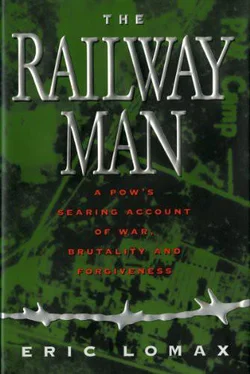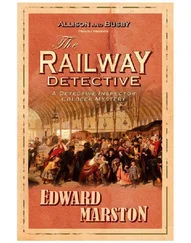Eric Lomax - The Railway Man
Здесь есть возможность читать онлайн «Eric Lomax - The Railway Man» весь текст электронной книги совершенно бесплатно (целиком полную версию без сокращений). В некоторых случаях можно слушать аудио, скачать через торрент в формате fb2 и присутствует краткое содержание. Город: New York, Год выпуска: 1995, ISBN: 1995, Издательство: W.W. Norton & Company, Жанр: Биографии и Мемуары, nonf_military, на английском языке. Описание произведения, (предисловие) а так же отзывы посетителей доступны на портале библиотеки ЛибКат.
- Название:The Railway Man
- Автор:
- Издательство:W.W. Norton & Company
- Жанр:
- Год:1995
- Город:New York
- ISBN:0393039102
- Рейтинг книги:4 / 5. Голосов: 1
-
Избранное:Добавить в избранное
- Отзывы:
-
Ваша оценка:
- 80
- 1
- 2
- 3
- 4
- 5
The Railway Man: краткое содержание, описание и аннотация
Предлагаем к чтению аннотацию, описание, краткое содержание или предисловие (зависит от того, что написал сам автор книги «The Railway Man»). Если вы не нашли необходимую информацию о книге — напишите в комментариях, мы постараемся отыскать её.
is a powerful tale of survival and of the human capacity to understand even those who have done us unthinkable harm.
The Railway Man — читать онлайн бесплатно полную книгу (весь текст) целиком
Ниже представлен текст книги, разбитый по страницам. Система сохранения места последней прочитанной страницы, позволяет с удобством читать онлайн бесплатно книгу «The Railway Man», без необходимости каждый раз заново искать на чём Вы остановились. Поставьте закладку, и сможете в любой момент перейти на страницу, на которой закончили чтение.
Интервал:
Закладка:
I did not tell Patti all at once about Malaya and Siam during the war, but it came out slowly. She was discovering for herself that she was living with someone with unusual problems, but meanwhile I carried on with my quest. In January 1985, I published an article in the London ‘FEPOW Forum’, a newsletter for ex-prisoners-of-war, appealing ‘before it is too late’ for information about the events at Kanburi in 1943.1 asked for eyewitness accounts, for information about the ‘American’ interpreter and the Dutch doctor. As for the seven officers, I looked around and they were all dead, Mac having died a few years before, and ‘Daddy’ Smith, the frailest of all of them, living until the age of ninety before passing away in 1984. And I could tell that Fred was dying: ‘My chest has been very bad lately and the cough is getting worse’, he wrote to me that year; in the same letter he admitted something which he had always been able to keep concealed; ‘My nerves were cracking during the nights, always at night-time.’ Fred’s heart – that indestructible rock of support – gave out five years ago.
About twenty letters, almost all of them kind and considerate, came back after the article was published. One of them came from T. C. Brown, who had been a sergeant in the Royal Norfolk Regiment:
Your article in Forum brings back horrific memories of that night … I remember you all lined up in front of the Guard Room and the night of the bashing the Kempei came rushing to our hut and pulled up the bamboo bridge over the drain to our hut, we thought we were in for a bashing but of course you were the victims, what a night, the cries of mercy was terrible and there we lay not being able to do anything but pray for you, it was dark so we could not see what was going on… The following day two of you were missing off the ‘parade’ outside the Guard Room if I remember right it was the tall slim officer and a small officer in your party… After the Japs surrender a Cpl Johnson of the Foresters told me that he knew the two missing officers were buried behind Guard Room, apparently he was on fatigues over the Jap Quarters and found an Officers Cap there soaked in blood… Never will I forget the mess you people were in after the bashings, I was NCO i/c Sanitation and saw quite a bit of you on your journey under escort to the latrines.
There were many letters like this, which touched me but gave me no information of the kind I was seeking.
Then a letter came from Henry Cecil Babb of Oxford, a former regular army chaplain who was now almost eighty years old. He had served in Malaya since December 1940 and been captured, like the rest of us, at the end of that disastrous campaign. He arrived at the main POW camp at Kanburi in August 1945 just as the war was coming to an end, and he was told by some junior officers that about two years earlier, two unidentified POWs, who had been involved in the operation of a radio in the railway workshops camp nearby, had been killed and their bodies dumped in a latrine near the guardroom. The officers had asked him if, despite the passage of time, he would conduct a formal service. Babb agreed, and read the prayers for The Burial of the Dead, the first time he had ever done so without knowing the names of the deceased. ‘For I am a stranger with thee: and a sojourner, as all my fathers were.’ It was good to think of poor Hawley and Armitage, the ladies’ man and the scholar, being commemorated in that squalid place where no-one seems to have remembered them.
I wrote to Babb and told him the names of the men he had prayed for, and when he replied he told me that after the war he had not returned to England immediately, but had volunteered to take part in an official War Graves Commission party which was setting out to travel the entire length of the railway, all 258 miles of it, in a search for rough cemeteries and for the bodies of missing men. The group had been organized by the Allied administration in Bangkok and consisted of sixteen British and Australian troops, together with a young Japanese interpreter. The expedition left Bangkok on 22nd September and went as far as Thanbyuzayat in Burma, travelling on open wagons fitted up with attap roofs, and returned on 10th October 1945 after locating 144 cemeteries – mostly trackside graves in the jungle -and over 10,000 bodies. Babb recalled conducting another burial service, for the entire crew of a USAAF B29 bomber which had been shot down just before the end of the war in the mountains on the Burmese side of the frontier.
Babb had lost touch with all the members of the search party, but he told me that the interpreter had recently sought him out and that he might be able to help me in my search for information. Would I, he asked, be willing to let him make enquiries on my behalf? I asked specifically for information about the identity of the men who had beaten me so meticulously and of the hateftil ‘American’ interpreter who had supervised the beatings; I was trying to tie down the history of the murders first, and I confined the questions which I passed to Babb to that night in the main Kanburi camp. I hardly expected to receive any news from so unlikely a quarter and was glad diat Babb was acting as an intermediary. Direct correspondence with a former Japanese soldier would have been impossible for me.
This man was called Nagase Takashi, and he lived in the city of Kurashiki. He wrote to Babb, saying that he could not help him with the information he required, but that he thought the man in question had died soon after the war.
Babb suggested that some of the information I was seeking might be in the Public Record Office in Kew, where records of some of the war crimes trials were now held. In the spring of 1985,1 found myself sitting at a quiet table reading fading copies of old documents in File W0235/822, the official record of the trial of those held responsible for the deaths of Captain Hawley and Lieutenant Armitage and for the ill-treatment of my colleagues and me.
It was an extraordinary afternoon. I forgot my surroundings, and entered a kind of trance as I read, visualizing the scene in Kanburi almost as a spectator. There was the guardroom, the Korean and Japanese guards, the wooden table, the drainage ditches, the areas of raw earth, the dust and heat and in the distance the hazy mountains which were a barrier between us and the friendly west; the row of British army officers, beginning to suffer terribly from several hours of exposure to the heat, from the brilliance of the sun and from thirst, still standing to attention with great difficulty, and then from the dark the rabble emerging to beat the men.
I came to myself after several hours of reading and rereading the evidence, including some of the documents I had typed myself, feeling completely exhausted. Perhaps the most remarkable element in this experience was the curious sensation that I was reading something in which I was not personally involved. I was seeking these exact truths on behalf of some person I barely knew.
Babb moved from Oxford to Cambridge late in 1985, and I went to visit him. He was very old and ill, but clear-minded and articulate. I was not surprised to discover that he was, like so many of us, ambivalent about that part of his past. He had destroyed his POW notes and papers in the 1960s, and later regretted doing it; he tried to reconstruct them from copies in the Imperial War Museum. His faith had thinned after the war; he had exchanged religion for the certainties of mathematics, and taught the subject for years, returning to his role as padre only once, on a visit with ex-POWs to modem Thailand.
He gave me some information about his correspondent Nagase Takashi, who claimed to have become active in charitable causes near Kanburi in the post-war years, and who had just built a Buddhist temple close to the railway there. I read about his activities with cold scepticism and found the very thought of him distasteftil. I could not believe in the idea of Japanese repentance. He had organized a meeting of ‘reconciliation’ at the River Kwae Bridge, that too-famous structure which has given so many people such a false picture of POW life through the David Lean film (who ever saw such well-fed POWs?). I had not seen a Japanese since 1945 and had no wish ever to meet one again. His reconciliation assembly sounded to me like a fraudulent publicity stunt.
Читать дальшеИнтервал:
Закладка:
Похожие книги на «The Railway Man»
Представляем Вашему вниманию похожие книги на «The Railway Man» списком для выбора. Мы отобрали схожую по названию и смыслу литературу в надежде предоставить читателям больше вариантов отыскать новые, интересные, ещё непрочитанные произведения.
Обсуждение, отзывы о книге «The Railway Man» и просто собственные мнения читателей. Оставьте ваши комментарии, напишите, что Вы думаете о произведении, его смысле или главных героях. Укажите что конкретно понравилось, а что нет, и почему Вы так считаете.












